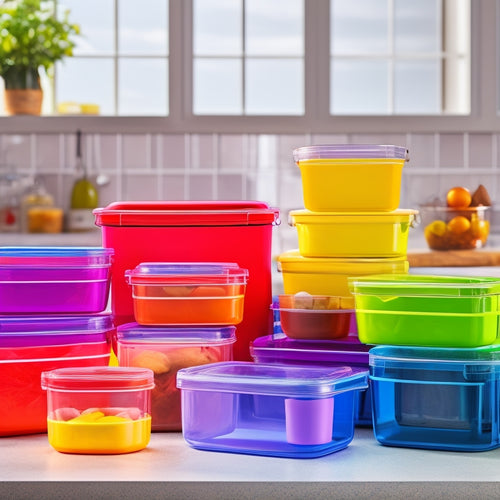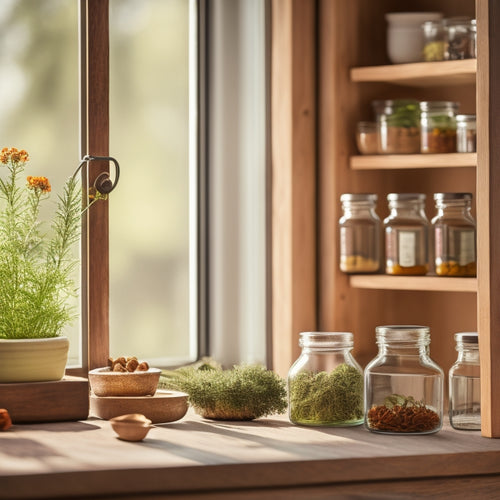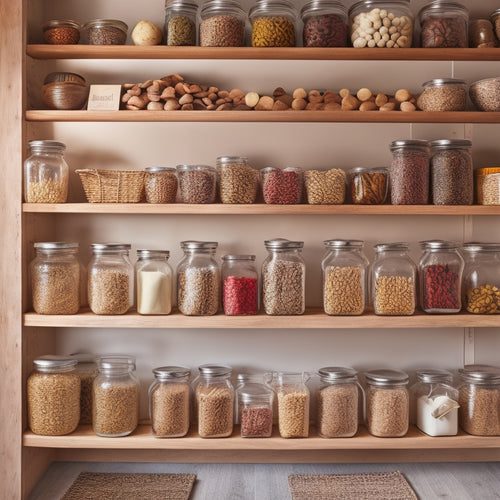
3 Best Kitchen Hacks for Elderly Cooks' Ease
Share
You can regain confidence in the kitchen by simplifying meal prep with weekly planning, scheduling cooking tasks according to your energy levels, and making a grocery list to avoid last-minute trips. Adapt your kitchen tools by replacing traditional utensils with ergonomic options and optimizing storage for frequently used items. Finally, streamline your cooking workflow by breaking down complex recipes into manageable tasks, focusing on one step at a time, and prepping all ingredients before starting to cook. By implementing these hacks, you'll be able to cook with ease and independence - and discover more ways to make cooking a joyful experience once again.
Key Takeaways
• Create a meal schedule based on energy levels and dietary needs to conserve energy and reduce cooking frequency.
• Optimize kitchen layout with ergonomic utensils, efficient storage, and a functional 'work triangle' to reduce strain and improve accessibility.
• Break down complex recipes into manageable tasks and focus on one step at a time to reduce mental and physical fatigue.
• Prep all ingredients before starting to cook to save time and energy during meal preparation.
• Consider online shopping or delivery services for grocery shopping to minimize trips to the store and reduce physical exertion.
Simplifying Meal Preparation Tasks
By streamlining meal prep tasks, you can conserve energy and reduce frustration in the kitchen, allowing you to focus on the joy of cooking.
One essential step is meal planning, which helps you decide what to cook and when. This way, you can create a schedule that suits your energy levels and dietary needs. Take some time to plan your meals for the week, considering your favorite recipes and ingredients you already have at home. This will also help you make a grocery list, avoiding last-minute trips to the store.
When you're grocery shopping, try to stick to your list and avoid impulse buys. Consider shopping online or using a delivery service if you have mobility issues.
You can also prep ingredients in advance, like chopping vegetables or marinating meats, to make cooking easier and faster. By simplifying these tasks, you'll be able to enjoy cooking again, without feeling overwhelmed.
Adapting Kitchen Tools and Layout
As you navigate your kitchen, you're likely to encounter tools and layouts that no longer cater to your needs, and it's time to reassess and adapt them to guarantee a comfortable and enjoyable cooking experience.
Making a few simple changes can make a significant difference. Consider replacing traditional utensils with ergonomic utensils designed to fit comfortably in your hand, reducing strain and discomfort.
You can also reassess your kitchen layout to prioritize efficient storage, keeping frequently used items within easy reach.
Here are a few more ideas to get you started:
- Install pull-out shelves or lazy susans to reduce bending and straining
- Use a utensil holder with a non-slip base to keep items organized and within reach
- Rearrange your kitchen to create a 'work triangle' between your stove, sink, and refrigerator, reducing walking distances and improving workflow.
Streamlining Cooking Workflow
You can simplify your cooking process by breaking down complex recipes into manageable tasks, allowing you to focus on one step at a time. This approach helps you conserve energy and reduce overwhelm.
Start by reading through the recipe and identifying the tasks that can be done ahead of time, such as chopping vegetables or marinating meat. Then, create a timeline for each step, leaving some buffer time in case things take longer than expected.
Implementing time-saving tips and organization strategies can also streamline your workflow. For instance, prep all your ingredients before starting to cook, and keep them within easy reach. Use a utensil organizer to keep your countertops clutter-free, and consider investing in a cooking station with built-in storage.
Frequently Asked Questions
How Can I Maintain My Independence in the Kitchen Despite Physical Limitations?
You can maintain independence in the kitchen despite physical limitations by using adaptive tools, like ergonomic utensils and non-slip mats, and opting for easy recipes that require minimal prep and cooking time.
Are There Any Senior-Friendly Cooking Classes Available in My Area?
Finding senior-friendly cooking classes is like finding a needle in a haystack, but you're in luck! You can search online for classes tailored to seniors, or opt for in-home lessons that cater to your needs and schedule.
Can I Still Cook if I Have Difficulty Tasting or Smelling Food?
You can still cook if you have difficulty tasting or smelling food! Focus on texture modifications and flavor pairing to create delicious meals. Try experimenting with spices, herbs, and acidic ingredients to enhance flavors.
Are There Any Kitchen Safety Devices Specifically Designed for Seniors?
As you navigate the kitchen, a lifeline of support awaits; discover senior-friendly kitchen gadgets, such as automatic shut-off appliances and adaptive utensils, designed to anchor your independence and guarantee a safe cooking haven.
How Do I Stay Motivated to Cook When Living Alone?
When living alone, you might struggle to stay motivated to cook, but consider trying meal delivery services or exploring cooking apps that offer social connections and recipe inspiration to keep you engaged and excited about cooking.
Related Posts
-

Stackable Kitchen Containers for Modular Systems
Stackable kitchen containers for modular systems change your cooking space by maximizing vertical storage and enhanci...
-

Spice Rack With Integrated Herb Garden
A spice rack with an integrated herb garden alters your kitchen into a culinary haven. You'll have fresh herbs at you...
-

Innovative Pantry Storage Ideas for Homes
Revamp your pantry into an efficient space with innovative storage solutions. Use vertical storage options like ceili...


